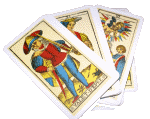
Bohemian Gothic Tarot
KING OF CUPS
Lighter or more conventional meanings
Someone who has repressed his creativity in favour of duty * A loving family man who sometimes longs to break out and do something eccentric or outrageous * Turning your creativity to help and support those close to you * Unpredictability - repressed artistic and emotional desires may cause sudden bursts of irrational anger.
Darker, shadow or more hidden meanings
Trying to repress an unhealthy desire * Searching for true love, but without success * Someone who struggles between their need for a higher love and their baser instincts and lusts.Nosferatu gazes longingly, almost tenderly, at a beautiful young woman who stands, oblivious to him, at her window. We tend to think of the predatory sides of the vampire, but there is also another aspect, that of a lonely man who has become a monster and is now cut off from all life and, most tellingly of all, from love and affection. In Murnau's 1922 film Nosferatu, the central plot theme is the idea that the Nosferatu ("undead') Count Dracula might long for the ordinary love of a good woman. This makes him vulnerable to being destroyed and in an oddly touching scene we see him being tricked into believing that he is loved, and so allowing himself to be seduced into staying too long with his "victim" (or is she aggressor?) and so dying in the light of the dawn.
This card is all about someone who has repressed his emotions, and sublimated his desires and dreams to duty and necessity. The King of Cups is, like all the Kings, an impressive figure, strong and determined, but here we see both his sadness and also his tendency to be dangerous. There is an anger in this person that can come out suddenly and with great ferocity. Deprived of fulfilling his own need to love and to enjoy life, he may, like a vampire, instead suck this from others, leaving them drained and exhausted.
When reading the King of Cups it will be useful to question why and in what ways this person has had to forgo their own creative ambitions. This King can be seen in the corporate employee who really wanted to be a fine artist, the salaried and secure accountant who once dreamed of training as an actor, or the advertising copywriter who has put away the novel he began as a young man. Then again, the scope of the ambition could be smaller; the enthusiastic amateur dramatics director who had to give it up to be with his young family or the man who loved crafting furniture in his workshop but has no time for it now that he's had to take a second job to support his family - these are both more modest examples of the type. Don't forget though, that the Bohemian Gothic version of this card refers to romance and love more than artistic endeavours, and also, by implication, warns us that thwarted emotions can turn into dangerous aggression. So look too for these two aspects of the card when you are deciding how to interpret it.
Some further ways to consider this card
Why does the young woman not see Nosferatu gazing at her? What is it in her, in particular, that attracts him?But first on earth, as Vampyre sent,
Thy corse shall from its tomb be rent;
Then ghastly haunt the native place,
And suck the blood of all thy race;
There from thy daughter, sister, wife,
At midnight drain the stream of life;
Yet loathe the banquet which perforce
Must feed thy livid living corse,
Thy victims, ere they yet expire,
Shall know the demon for their sire;
As cursing thee, thou cursing them,
Thy flowers are withered on the stem.
- John William Polidori, The Vampyre, a Tale.
The nosferatu do not die like the bee when he sting once. He is only stronger, and being stronger, have yet more power to work evil. This vampire which is amongst us is of himself so strong in person as twenty men, he is of cunning more than mortal, for his cunning be the growth of ages, he have still the aids of necromancy, which is, as his etymology imply, the divination by the dead, and all the dead that he can come nigh to are for him at command; he is brute, and more than brute; he is devil in callous, and the heart of him is not.
- Bram Stoker, Dracula.









